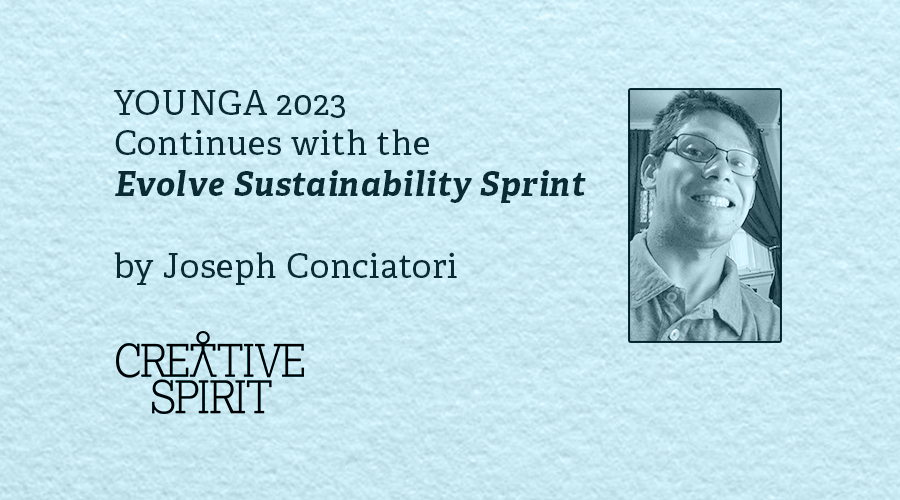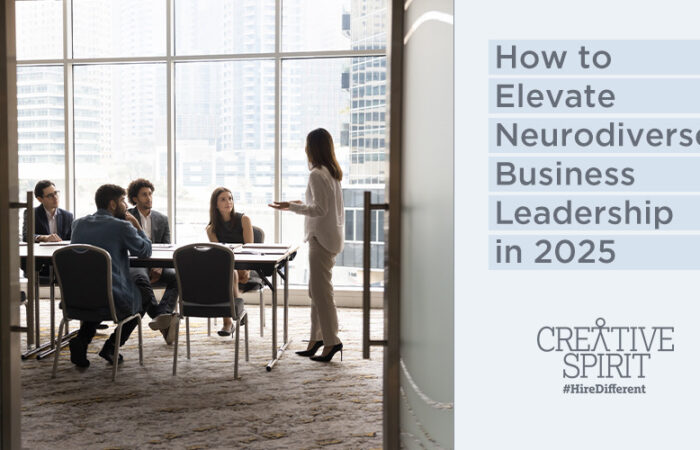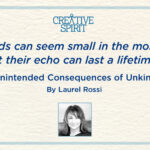Written By Joseph Conciatori, Creative Spirit Candidate and Advocate
November 12, 2023

On Saturday, October 14, young changemakers from around the world – including yours truly – participated in the EVOLVE Sustainability Sprint. Hosted by Joni Roberts, the founder of Evolution University, the event challenged delegates to create compassion-centric solutions to global issues, such as climate change, poverty, and inequality.
Joni introduced herself to the delegates and then spoke about Evolve Sustainability Sprint and about how consumer-driven economics has degraded our air, land, water, forests, ecosystems, and societies. She then quoted Dr. Jane Goodall, noting that the rampant destruction of natural resources and human societies over the past 50 years is “a disconnect between the clever brain and the human heart,” a heart naturally inclined toward love and compassion. Joni continued by defining empathy and compassion, and then asking us how we can take action to improve conditions and experiences for everyone on this planet – including ourselves.
Joni then explained that empathy can be attributed to genetic factors, such as greater numbers of mirror neurons in our brains. She continued by comparing people’s sensitivity levels to flowers, likening the 30 percent of highly sensitive individuals to orchids, the 40 percent of moderately sensitive persons to tulips, and the least-sensitive 30 percent to dandelions. I found this analogy fascinating. I also learned that thirty percent of animals were also more highly sensitive than the rest of their respective species, which I also found intriguing.
After outlining the various stakeholders in the compassion-centered approach to decision making, Joni noted that the EVOLVE Sustainability Report Journey is a four-step process, starting with evaluation, then shifting to imagination, followed by innovation and finally implementation. She then explained that this framework is universal and can be applied seamlessly across any organizational structure in any sector.
Once Joni had finished describing the EVOLVE sustainability report framework, she invited me and my fellow delegates to join breakout rooms, where we would create compelling stories centered around randomly assigned UN Sustainable Development Goals (SDGs). My chosen group of delegates and I were asked to craft a story about people living on a tropical island surrounded by coral reefs, but unfortunately, the reefs were in decline, placing the islanders at greater risk of storms and erosion due to climate change. I suggested that we focus on a fisherman and his family. One delegate, Steph, tried to work out the story, pondering whether the fisherman and his family at the center of our story were one of multiple fishing families on the island. Another delegate, Nicholas, suggested that we should focus on one day in the fisherman and his family’s life. Meanwhile, Nimra, a delegate from Pakistan, noted that if we are not personally impacted by climate disasters, chances are we know someone who is.
After our initial ten-minute brainstorming session, we listened to the other groups as they shared their story ideas. Reese, a delegate in the SDG 10 group, introduced us to the main character in his and his fellow SDG 10 group delegates’ story. They had created a character named Sarah, a strong woman who was not only a refugee, but who still maintained some semblance of hope in the midst of uncertainty. Reese and his group then explained that Sarah’s children did not fully understand what was occurring around them. However, the group did note that the children felt the same emotion as their parents, and they also missed climbing the trees outside their former home.
I felt moved by Reese’s story, and although Sarah the refugee woman was a fictional character, my heart broke for her and her family. Next, my fellow delegates and I entered a second breakout room, where we had fifteen minutes to devise a new story about the fisherman and his family. In this second session, we needed to convince investors or other stakeholders that we must help the fisherman, his family, and his community. I suggested that we should all agree to reduce global carbon emissions by 50 percent, but we still needed to picture a scenario in which the fisherman and his family benefited from this change.
Steph then noted in the Evolve Sustainability Sprint that we not only needed to protect the reefs, but we had to understand how these changes would impact the islanders’ livelihoods. Another delegate, Lynn, asked Steph how she thought we could help the natives in our story. We then contemplated whether these changes meant the fisherman and others like him did not have to travel as far, allowing them to spend more time with each other and in their community. Steph then suggested that the islanders could organize a festival to celebrate their newly increased fish supply. She also recommended that the islanders should have another festival where they plant trees all over the island, a suggestion I liked.
Once our second breakout room discussion was finished, we shared our ideas with the other delegates, while they shared their new stories with us. Tanja, a member of the SDG 10 group along with Reese, reiterated the story of Sarah the refugee woman and her children and then pondered several questions. She asked how the story would be different if Sarah and her family’s journey was safer and cheaper, and if they were able to integrate into their new country’s culture while continuing their own traditions. Meanwhile, Mariam Zubair, a delegate in the SDG 16 group, crafted a story about a father and son who set off for a walk in their local park one day. However, when they returned home, the father and son found their apartment gone, and the son’s mother was missing. Mariam then suggested that there should be a way to help the father and son reconnect with the mother, which I considered an excellent idea.
My breakout group and I reconvened to brainstorm additional ideas for our story. For example, we suggested having the locals lead guided boat tours of the reefs around their island if they can no longer fish in the Evolve Sustainability Sprint. I recommended tree planting as part of the festival, a suggestion with which the group agreed. We then decided to center the festival in our story around planting mangrove forests, which filter water and restrict tides, effectively reducing the risk of erosion. Steph then noted that planting trees during the festival would give the islanders joy, a sentiment which I shared.
After a while, we determined that the festival is a celebration of new growth and a revival of the island’s coral reefs. Steph then added that local schools and other organizations should organize frequent beach cleanups, which I thought was an excellent idea. Meanwhile, we also determined that cruise ships visiting the island should dock farther away to prevent reef damage, and we should also have people stationed in deep water explaining what tourists should and should not do. Of course, we made sure to involve native islanders in every step of the process.
Once we had finished our final breakout room session, Carolina – a delegate from the SDG 16 group – mentioned the Evolve Sustainability Sprint and how she and the others had placed the story in a relatable context: the ongoing war between Ukraine and Russia. She noted that fortunately for the father-son duo in the story, there were local organizations who helped find the mother and reunite her with her husband and their son. Carolina then suggested an app that not only tracked the locations of dynamite explosions, but also helped people like the father and son in her story find food, shelter, healthcare, and other essential services. Not surprisingly, I thought that was an excellent idea.
Once we had finished sharing our stories and the Evolve Sustainability Sprint, Joni closed the discussion. Shortly thereafter, I logged out of Zoom for the day, empowered to make a difference by showing compassion and empathy to everyone I meet, everywhere I go.






